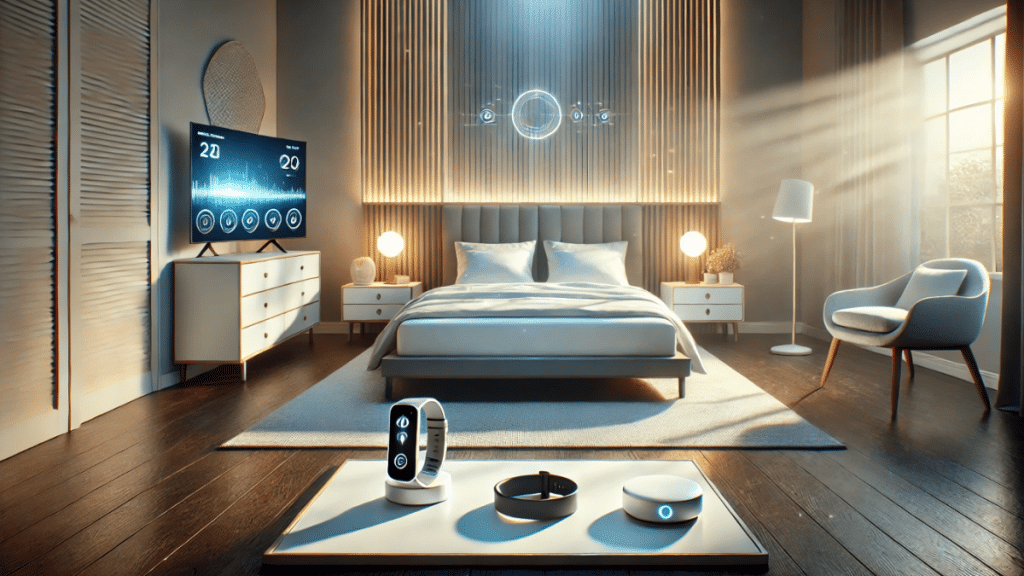Quality sleep is becoming more challenging as our modern lifestyles keep us engaged constantly. Activities like online gaming, late-night screen use, and nonstop connectivity overstimulate the mind, making it harder to relax and sleep well. This drop in sleep quality often leads to reduced focus, mood issues, and overall health declines.
New technologies have stepped in to help improve sleep. Tools like smart beds, wearable trackers, and sleep-focused apps are designed to support the body’s natural rhythms, providing the rest needed to fully recharge. For those who often engage in high-stimulation activities, these innovations offer essential support for achieving balanced, restful nights.
Smart Beds: Personalized Sleep Support
Smart beds are transforming sleep with technology and customizable features. They use sensors to monitor sleep cycles, heart rate, and breathing, giving precise data on sleep quality and habits. Many models adjust automatically, changing firmness or temperature based on movement. For instance, the Sleep Number 360 Smart Bed adjusts firmness according to sleep position, which can improve sleep quality by up to 15%, according to users.
The demand for personalized sleep solutions has fueled growth in the smart bed market. In 2020, this market was valued at $2.44 billion and is expected to grow at 8.6% annually through 2028. As more people see the link between sleep and health, smart beds provide tailored support to minimize disruptions, helping users enjoy deeper, more restorative sleep.
Wearable Sleep Trackers: Data for Better Rest
Wearable sleep trackers offer detailed insights into sleep patterns, tracking duration, stages, and interruptions. Devices like Fitbit, Oura Ring, and Apple Watch monitor deep, light, and REM sleep cycles, helping users better understand their rest. Research in Nature and Science of Sleep shows that these trackers can greatly improve sleep hygiene awareness.
This data is particularly valuable for people with busy schedules. By identifying patterns, users can make specific changes, like reducing caffeine or limiting screen time. Studies suggest that avoiding screens an hour before bed can improve sleep quality by up to 30%. Sleep trackers help users make these adjustments, fostering a more restful environment.
White Noise Machines and Sleep Apps: Aiding Relaxation
White noise machines and sleep apps are powerful tools for better sleep. By providing sounds like rainfall or ocean waves, they block disturbances and create a calming environment, with U.S. sales increasing over 20% annually. White noise machines can reduce awakenings by up to 38%, making them ideal for noisy surroundings, while sleep apps offer relaxation guides and breathing exercises to help users unwind.
Apps like Calm and Sleep Cycle combine soothing sounds with data on sleep patterns, which is useful for those with high-stimulation routines, like online gaming. Online casinos, known for their intense and engaging experiences, can make it difficult for online casino players to relax. White noise machines and sleep apps allow online casino players to transition smoothly from gaming to rest, balancing relaxation with entertainment.
Ambient Light Devices: Adjusting to Natural Rhythms
Ambient light devices replicate sunrise and sunset patterns, supporting the body’s circadian rhythm and making sleep transitions easier. They gradually brighten in the morning and dim at night, preparing the body for natural wake-ups and sleep without loud alarms. A study in the Journal of Clinical Sleep Medicine found that users experienced a 15% improvement in sleep quality and woke feeling more refreshed.
These devices are especially helpful for those with irregular schedules or limited natural light exposure, such as shift workers or urban residents. By simulating outdoor light, they help maintain a stable internal clock. For example, the Philips Wake-Up Light improved the ease of waking and alertness for 92% of users.
Ambient light devices are also helpful after high-stimulation activities like online gaming. For frequent players exposed to bright screens, these tools help reset the internal clock, easing the shift from screen time to restful sleep.
Conclusion
Smart beds, sleep trackers, white noise machines, and ambient light devices offer targeted solutions for better sleep. These technologies not only improve rest but also boost focus, mood, and overall health, especially after high-stimulation activities like online gaming. As more people prioritize quality sleep, these tools provide essential support, helping users stay sharp and healthy. By adjusting for better mornings or winding down after busy days, these innovations empower people to take control of their sleep and enhance daily well-being.
